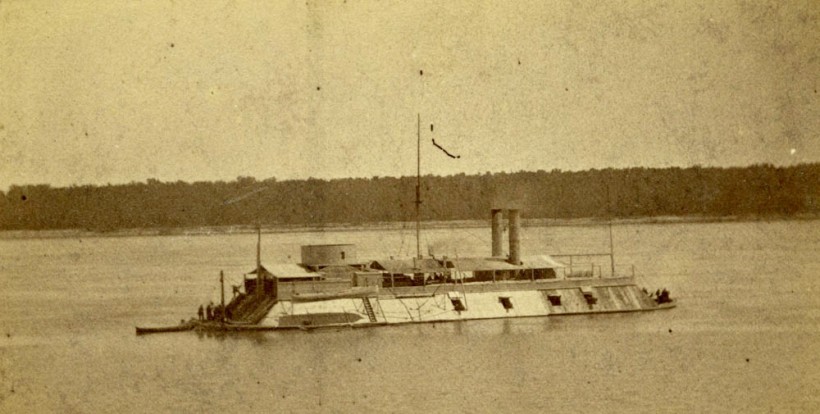I found the following letter, written by a civilian resident of Vicksburg during the 1863 siege, in the Natchez Daily Courier, June 30, 1863. As civilian accounts written during the siege are somewhat rare, I wanted to share this very interesting letter:
– Mississippian:
Republic of Vicksburg, June 13th, 1863
Friend F. – An opportunity is just offered me, through a friend, of communicating with the “outside barbarians,” of which I gladly avail myself.
I am not scarred, nor shelled, nor starved out of existence yet, as you perceive; nor even driven to live on worse fare than beef and bread, with the customary concoction of corn coffee. Indeed, no one here is starving – nor any fears of it entertained. The idea of surrender, for any cause, is never dreamed of here. The hissing abominations flying upon the city in every direction produces a pleasing (?) excitement to aid digestion and break the monotony of our isolation. They fly right and left, up and down, almost incessantly except during the midday heat – which is made up for with renewed vim at sundown. Then they boom loud enough to wake Hannibal or Hugh O’Neil, if they slept this side of the Atlantic.

From the enemy’s works, back of the city, Parrott shells are often thrown as far as the river, while, simultaneously, the mortars, from their cover of woods beyond the Peninsula, send the bombs, in bursting fragments, to the remotest ends of our Republic.
Numerous caves have been constructed in the sides of the hills within the lines by citizens for the protection of their families. Compared with the fury of the bombardment since the investment, the casualties are very small. In the intrenchments, the danger is very little – unless to the over-curious, who are, duck like, given to popping their heads over the breastworks, which the Yankee sharpshooters promptly pop at, frequently popping their heads over the breastworks, which the Yankee sharpshooters promptly pop at, frequently popping the owner into eternity.

But the tedium and monotony of trench duty is its most disagreeable feature. There is an unceasing din of sharpshooters’ rifles kept up daily along the lines, doing little damage. On the river front, little of importance has occurred. The boats sometimes shell our batteries at long range from below – none venturing near since we sunk the ironclad Cincinnati, on the 27th ult. She sailed boldly down under the upper battery. Soon found in a sinking condition, she was put up stream and abandoned. Within an hour she sunk to the hurricane deck.

Yours, very sincerely,
A. G*****
Although the writer of this letter is only identified by the first and last initials of his name, I can make a guess as to who he was. “A.G.” is probably Antonio Genella, a very prosperous Vicksburg merchant.
Antonio Genella was born in Switzerland, and immigrated to the United States as a young

man. He ended up settling in Vicksburg, and by the time of the Civil War he had made his fortune as a merchant specializing in fine china. On the 1860 Census for Warren County, Genella listed the value of his real estate holdings at $40,000, and the value of his personal estate at $100,000. In 2016 dollars, Genella’s net worth would be over 3 and a half million dollars.
During the Civil War Genella apparently did a booming business with the Confederate Medical Department, supplying them with literally hundreds of different items for their soldier’s hospitals in Vicksburg. During the siege of Vicksburg, Genella was able to keep his doors open, but not without some difficulties; the Portland Daily Advertiser (Portland, Maine), noted on July 25, 1863: “Gen. Pemberton, it is said, refused to allow citizens to draw from the army stores, insisting that the private stock in the city should be used for that purpose. Mr. Genella, a prominent merchant in this city, being accused of extortion in this matter, publishes a card in vindication of his character.”

After Vicksburg surrendered on July 4, 1863, Genella remained in the city; the Richmond Enquirer of January 13, 1864, noted that the enterprising gentleman had managed to reopen his store. To keep his store open during the Yankee occupation of Vicksburg, Genella apparently established a close relationship with the city provost marshal. In fact, some felt his business dealings with the provost marshall, whose last name was Wardell, were not entirely above board.

In 1865 The Joint Committee on the Conduct of the War issued a report about the activities of the provost marshal in Vicksburg; one witness told the committee, “That the provost marshal of Vicksburg, Wardell, is a thorough secesh friend; that the said Wardell sells passes to the rebels to get through the lines…That every storekeeper in Vicksburg has to bribe said Wardell by sums from $500 to $2,000 to carry goods through the lines; that one merchant, A. Genella, is Wardell’s especial protege; that said Genella is a rank secesh, and that before the attack on Vicksburg, by General Grant, said Genella offered $5,000 to the battery that may sink the first Yankee cannon-boat.”
Antonio Genella managed to weather these storms, and after the war ended his kept his business intact. The old merchant passed away on June 12, 1871, and is buried in Cedar Hill Cemetery in Vicksburg.